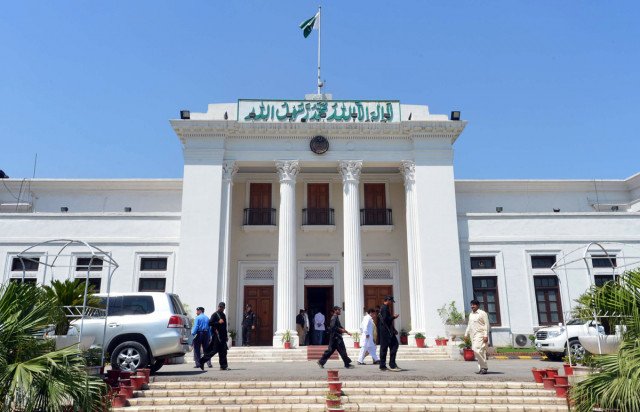Assembly diary: When a spade is not a spade
Lawmakers pore over trivial details, avoiding discussions on terrorism.

Once elected, lawmakers tend to forgo the concept of public interest. PHOTO: AFP
Our politicians’ failure to see through events and issues sometimes reaches mind-boggling proportions. As elected members represent people at the highest forum of the province, people also expect their representatives to speak and raise issues affecting the lives of all.
However, once elected, lawmakers tend to forgo the concept of public interest and instead pursue frivolous issues with such zeal that it leaves one gasping for breath.

The latest session of the Khyber-Pakhtunkhwa (K-P) Assembly was a case in point. It started on September 10, just a day after the all-parties conference (APC) – wherein the country’s political leadership gave the go-ahead to negotiate with militants.
The APC was followed by the K-P government’s announcement to pull out troops from some parts of Malakand division, while on September 15 Taliban killed a senior military commander in Upper Dir.
Throughout the eight day-long sessions, assembly members spent hours and hours discussing the most frivolous of issues pertaining to their constituencies. But nobody even bothered to talk about issues of life and death for this province.
K-P has borne the brunt of over a decade-long war and has witnessed enough bloodshed; one expected lawmakers to take up this issue at the floor of the house, especially in the backdrop of a national discussion on counter-terrorism. Yet, no one bothered to speak a single word on these crucial issues.

The provincial assembly met after a one-day recess on Monday. One hoped at least the provincial government would make some statement about the slaying of Major General Sanaullah Khan Niazi at K-P’s highest forum. However, no statement came from the treasury benches, and none came from the opposition benches.
The house prayed for the martyred major general after a minister from one of Pakistan Tehreek-e-Insaf’s (PTI) coalition partners pointed it out. This was followed by a deafening silence, after which occupants of both treasury and opposition benches went into their usual harangues about postings and transfers in their respective constituencies.
Towards the end of the session, Awami National Party’s (ANP) parliamentary leader Sardar Hussain Babak was the lone wolf to speak out on this issue. But his plea probably fell on deaf ears, as no one bothered to talk about it after him. Babak reminded MPAs, political leaders had agreed on talks with militants in the APC, but they (the militants) had also killed a general.
He questioned whether those creating anarchy were interested in talks. He also reminded the house prayers and good wishes alone were not enough to bring peace. “The public has been demoralised. If it was not the case, then all institutions and representatives of the people should join hands for peace,” said Babak.
He said people were asking what the government was doing about terrorism, but no one dared to speak on this issue.
Babak’s speech lurked on the fringe of nostalgia, as it was the same house which had witnessed the most vociferous denouncement of militants from former information minister Mian Iftikhar Hussain and the late Bashir Ahmed Bilour in the previous government.
But all that was the talk of yesteryears. New rulers of Peshawar and Islamabad seem to be only capable of muffled groans after every act of terror, lacking the guts to call a spade, a spade.
In an age of confusion and uncertainty, this seems to be latest myopia afflicting K-P.
Published in The Express Tribune, September 20th, 2013.













COMMENTS
Comments are moderated and generally will be posted if they are on-topic and not abusive.
For more information, please see our Comments FAQ